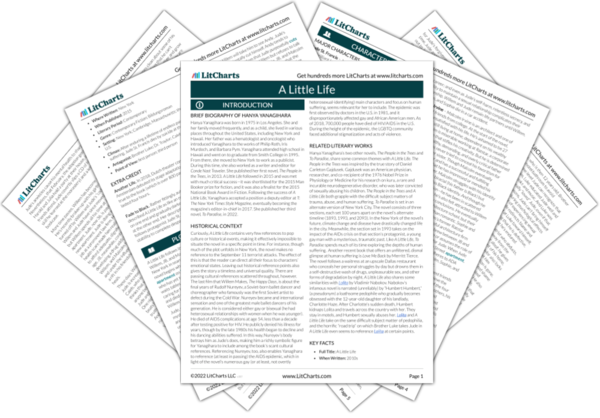Brother Luke Quotes in A Little Life
But now he knows for certain how true the axiom is, because he himself—his very life—has proven it. The person I was will always be the person I am, he realizes. The context may have changed […]. But fundamentally, he is the same person, a person who inspires disgust, a person meant to be hated. And in that microsecond that he finds himself suspended in the air, […] he knows that x will always equal x, no matter what he does, or how many years he moves away from the monastery, from Brother Luke, no matter how much he earns or how hard he tries to forget. It is the last thing he thinks as his shoulder cracks down upon the concrete, and the world, for an instant, jerks blessedly away from beneath him: x = x, he thinks. x = x, x = x.

Unlock explanations and citation info for this and every other A Little Life quote.
Plus so much more...
Get LitCharts A+He was careful never to say his name aloud, but sometimes he thought it, and no matter how old he got, no matter how many years had passed, there would appear Luke’s face, smiling, conjured in an instant. He thought of Luke when the two of them were falling in love, when he was being seduced and had been too much of a child, too naïve, too lonely and desperate for affection to know it. He was running to the greenhouse, he was opening the door, the heat and smell of flowers were surrounding him like a cape. It was the last time he had been so simply happy, the last time he had known such uncomplicated joy. “And here’s my beautiful boy!” Luke would cry. “Oh, Jude—I’m so happy to see you.”
Eventually, he made some rules for himself. First, he would never refuse Willem, ever. If this was what Willem wanted, he could have it, and he would never turn him away. Willem had sacrificed so much to be with him, and had brought him such peace, that he was determined to try to thank him however he could. Second, he would try—as Brother Luke had once asked him—to show a little life, a little enthusiasm.

Brother Luke Quotes in A Little Life
But now he knows for certain how true the axiom is, because he himself—his very life—has proven it. The person I was will always be the person I am, he realizes. The context may have changed […]. But fundamentally, he is the same person, a person who inspires disgust, a person meant to be hated. And in that microsecond that he finds himself suspended in the air, […] he knows that x will always equal x, no matter what he does, or how many years he moves away from the monastery, from Brother Luke, no matter how much he earns or how hard he tries to forget. It is the last thing he thinks as his shoulder cracks down upon the concrete, and the world, for an instant, jerks blessedly away from beneath him: x = x, he thinks. x = x, x = x.

Unlock explanations and citation info for this and every other A Little Life quote.
Plus so much more...
Get LitCharts A+He was careful never to say his name aloud, but sometimes he thought it, and no matter how old he got, no matter how many years had passed, there would appear Luke’s face, smiling, conjured in an instant. He thought of Luke when the two of them were falling in love, when he was being seduced and had been too much of a child, too naïve, too lonely and desperate for affection to know it. He was running to the greenhouse, he was opening the door, the heat and smell of flowers were surrounding him like a cape. It was the last time he had been so simply happy, the last time he had known such uncomplicated joy. “And here’s my beautiful boy!” Luke would cry. “Oh, Jude—I’m so happy to see you.”
Eventually, he made some rules for himself. First, he would never refuse Willem, ever. If this was what Willem wanted, he could have it, and he would never turn him away. Willem had sacrificed so much to be with him, and had brought him such peace, that he was determined to try to thank him however he could. Second, he would try—as Brother Luke had once asked him—to show a little life, a little enthusiasm.











